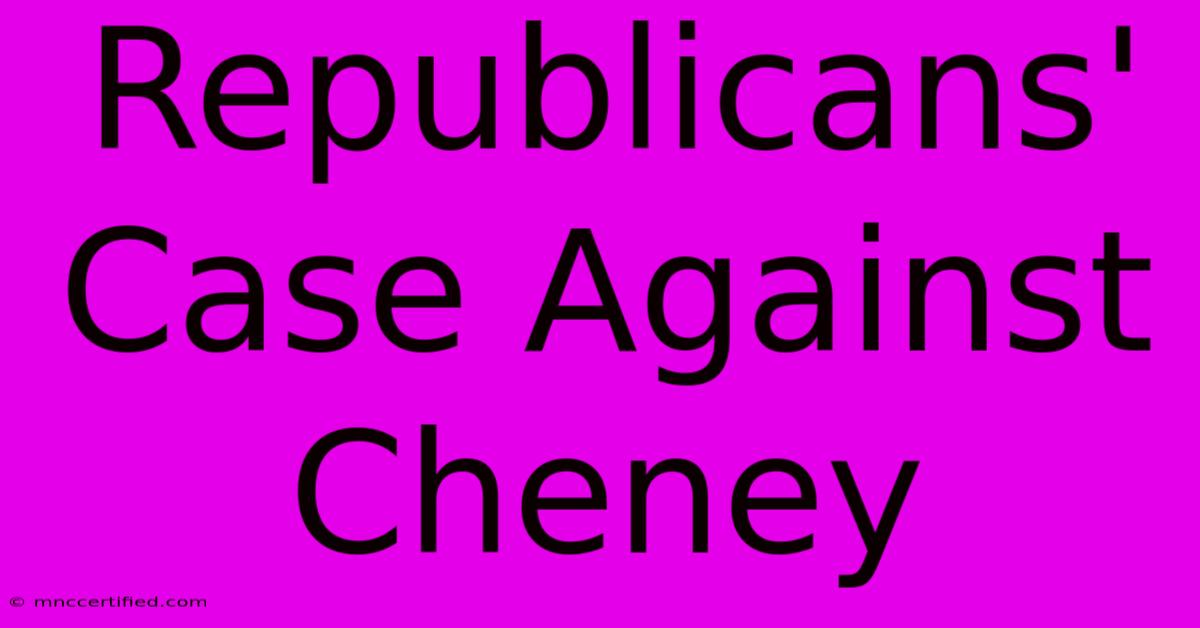Republicans' Case Against Cheney

Table of Contents
Republicans' Case Against Liz Cheney: A Deep Dive into the Party Rift
The rift between the Republican Party and Liz Cheney, once a rising star within the conservative ranks, has become a defining feature of contemporary American politics. This deep divide stems from fundamentally different views on the future of the party and, more crucially, the legacy of the January 6th Capitol attack. Understanding the Republican case against Cheney requires examining several key arguments and the broader context of the ongoing political realignment within the GOP.
The January 6th Committee and the Break
Cheney's unwavering participation in the House Select Committee investigating the January 6th attack served as the primary catalyst for her expulsion from the House Republican Conference. Republicans argued that her involvement was:
-
A betrayal of party loyalty: Many within the GOP viewed her participation as an act of disloyalty, prioritizing a partisan investigation over party unity. The focus on investigating fellow Republicans, regardless of the gravity of the accusations, was seen as damaging to the party's image and electoral prospects. This argument emphasizes the importance of internal party cohesion and a unified front against the Democratic Party.
-
An embrace of partisan politics: Republicans criticized the committee's proceedings as overtly partisan, alleging a lack of due process and a biased pursuit of a predetermined narrative. The argument hinges on the claim that the committee's actions were designed to damage the reputation of Donald Trump and other Republicans, rather than conducting a fair and impartial investigation.
-
A hindrance to Republican electoral success: Some argued that Cheney's vocal criticism of Donald Trump and her participation in the January 6th investigation alienated potential voters and hurt the party's chances in elections. This pragmatic argument prioritizes electoral success above all else, suggesting that Cheney's actions were detrimental to the party's overall goals.
Beyond January 6th: Differing Visions for the Republican Party
The conflict between Cheney and the Republican Party goes beyond the January 6th investigation. It reflects a deeper ideological struggle within the party itself:
-
Trumpism vs. Traditional Conservatism: Cheney represents a more traditional conservative ideology, emphasizing principles like limited government and fiscal responsibility. Her critics within the party represent a more populist, Trump-aligned wing, prioritizing loyalty to the former president above all else. This clash highlights the ongoing battle for the soul of the Republican Party and the question of who truly defines modern conservatism.
-
The Role of the Party Leadership: Cheney's outspoken criticism of the party leadership and her willingness to challenge the dominant narrative within the GOP further fueled the animosity towards her. This challenge to established power structures within the party is viewed by some as insubordination and a threat to party unity.
-
The Future of the Republican Party: The debate surrounding Cheney encapsulates a larger conversation about the future direction of the Republican Party. Will it remain a traditional conservative party, or will it continue its transformation into a populist movement centered around Donald Trump? Cheney's stance represents a clear opposition to the latter trajectory.
Cheney's Defense and the Counter-Narrative
While the Republican case against Cheney centers on loyalty, pragmatism, and the preservation of party unity, Cheney and her supporters offer a counter-narrative:
-
Defense of Democratic Principles: Cheney argues that her actions were motivated by a commitment to upholding democratic principles and accountability for those involved in the January 6th attack. This moral argument frames her actions as a necessary defense of American democracy.
-
Commitment to Truth and Transparency: Cheney emphasizes the importance of investigating the events of January 6th to ensure that such an attack never happens again. Her participation in the committee is presented as a commitment to truth and transparency, vital for a healthy democracy.
Conclusion: A Defining Moment for the GOP
The Republican case against Liz Cheney reflects a significant internal struggle within the party. It reveals a deeper ideological battle over the future direction of the party and its relationship with Donald Trump. Whether the Republican Party ultimately embraces Cheney's more traditional conservatism or continues its populist turn remains to be seen, but the conflict surrounding her stands as a defining moment in the party's recent history. The long-term consequences of this rift are likely to continue shaping American politics for years to come.

Thank you for visiting our website wich cover about Republicans' Case Against Cheney. We hope the information provided has been useful to you. Feel free to contact us if you have any questions or need further assistance. See you next time and dont miss to bookmark.
Featured Posts
-
Eddie Stobarts Cumbrian Legacy
Dec 19, 2024
-
Elton John Reimagines Christmas Classic
Dec 19, 2024
-
Death Of Eddie Stobart Founder 95
Dec 19, 2024
-
Southern Water Issue Schools Closed No Water
Dec 19, 2024
-
California Bird Flu Human Case Confirmed
Dec 19, 2024